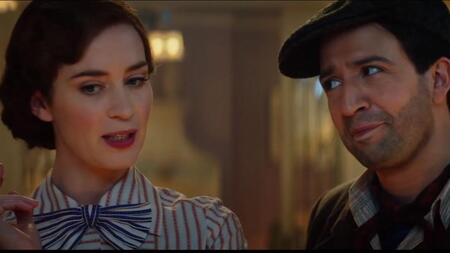C | The magical English nanny returns to help the next generation of the Banks family. Directed by Rob Marshall Starring Emily Blunt and Lin-Manuel Miranda Review by Jon Kissel |

With the two big roles staffed, one well and the other not so much, Mary Poppins Returns goes on to tell the story of the next generation of the Banks family. The magical nanny’s main purpose in the original, of fixing the work-focused father, is shunted onto that father’s now-grown son, a widower played by Ben Whishaw. Dead family members is a plot point so overused by Disney that it’s become shorthand for seriousness, and a viewer eventually figures out through so many Disney parents that the studio doesn’t have anything new to say. The emotional stakes, wherein a family missing its matriarch is still learning how to function without her, are tied in with the physical stakes of losing the house where the dead mom lived, but the former doesn’t seem like a problem to be solved instead of managed and the latter is hand-waved away thanks to a few cents turning into the worth of a London home over twenty years, despite a major market crash in the recent past. It was one thing for the original’s Mr. Banks to free himself from his prioritizing of his job over his family. It’s another thing for the sequel’s Mr. Banks to essentially be told, in gentle terms, to stop feeling sad about the death of his wife.
Reconciling the grief-based stakes with the whimsy of a Mary Poppins adventure is, in my mind, impossible, partly because the family seems harried but otherwise fine. They need money, not emotional help, and this inability to make the dead mom something to be resolved is my primary critical complaint. I was really reaching for something to grab onto and that theoretically provided the firmest hold, because I am otherwise not a person impressed by song and dance. Stylistically, the mixing of animation and live-action that must have been mind-blowing in the mid-60’s is… not that in 2019. It’s an admirable choice to so closely mimic the sound stage feel of the original when there must be technological advances that might’ve made Mary Poppins Returns look more seamless, but the chintzy look goes on longer than any nostalgic appreciation. The songs themselves have left my brain a day after watching the film, and the setpieces of dancing lamp-lighters instead of chimney sweeps are just as unmemorable.
The biggest change from the original is that Mary Poppins Returns has its own snide villain. Mr. Banks was the closest thing to a villain in the original, a choice that remains impressive. Here, Colin Firth’s greedy banker makes an easy mark, at least until he’s unseated by the most fantastical creation of Mary Poppins Returns: the benevolent banker. If the film wants to be taken on these terms, then I’ll again voice an annoying flaw that many movies, like 99 Homes or Wall Street, have in common when they depict nefarious financial actors. They make their villains engage in actively illegal activities when they don’t need to do so. What’s legal can be just as infuriating, but no, they have to forge or destroy documents, putting the focus on single bad actors instead of a system of incentives and legalese. If Mary Poppins Returns wants to engage children with dead parents, I don’t see why they can’t also squeeze in some difficult ideas about how decent people can get caught in compromising systems.
In all honesty, I did not give Mary Poppins Returns my full attention. By the half-hour mark, I was fighting the urge to turn it off, and shifting focus to video games allowed me to get through it. I wouldn’t hold it against anyone who said their kids love this movie, or that they were enchanted by certain sequences. I personally can’t imagine having to hear Miranda’s shaky accent in the background as my theoretical children watched this movie for the hundredth time, or having open-mouthed awe triggered at Meryl Streep’s turn as a gypsy bowl repairer or whatever. Blunt is a fine facsimile of Julie Andrews, but I choose to read Andrews’ absence as a tip that this wasn’t up to her standard. I hate to say it, but this was not for me. C-
 RSS Feed
RSS Feed